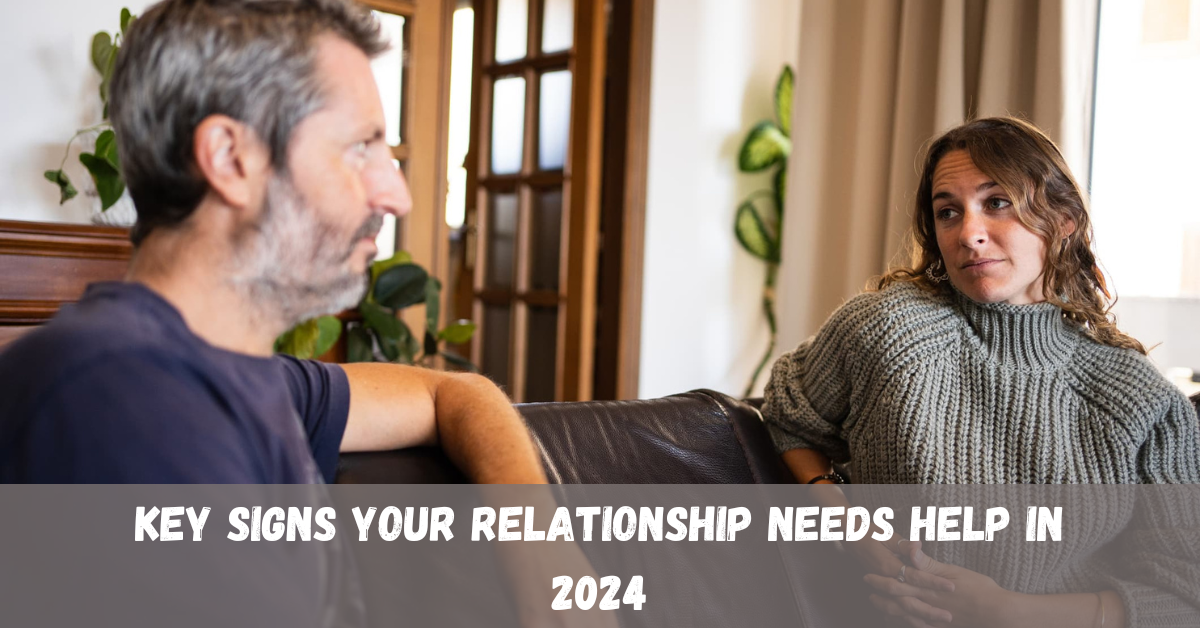If you’ve been feeling like your relationship is hitting a rough patch, you’re not alone. Every couple goes through ups and downs, but there are key signs to watch out for that indicate your relationship may need some extra attention. As a Dating Guru, I’ve seen it all, and I’m here to help you navigate through the warning signals that shouldn’t be ignored.
When communication starts to feel strained, and arguments become more frequent than moments of understanding, it’s time to take a step back and assess the state of your relationship. Ignoring these red flags can lead to bigger issues down the road. From lack of intimacy to constant misunderstandings, recognizing these signs early on can make all the difference in steering your relationship back on track.
Common Signs Your Relationship Needs Help

Recognizing the signs that your relationship is in trouble is crucial for taking proactive steps to address issues and strengthen your bond. Here are some common signs that indicate your relationship may need help:
1. Communication Breakdown
When you and your partner struggle to communicate effectively, it can lead to misunderstandings, unresolved conflicts, and feelings of distance. If you find yourselves constantly arguing, unable to express your thoughts and emotions openly, or feeling unheard, it’s a clear sign that your relationship’s communication needs improvement.
2. Lack of Quality Time Together
Spending quality time together is essential for maintaining a strong connection in a relationship. If you and your partner have drifted apart and find yourselves leading separate lives without engaging in shared activities or meaningful conversations, it may signal the need to prioritize spending more time together to nurture your bond.
3. Loss of Intimacy
Intimacy is a vital component of any healthy relationship, and its absence can indicate underlying issues. If physical intimacy has decreased significantly, or you and your partner no longer feel emotionally connected, it’s essential to address these changes openly and honestly to rekindle intimacy and closeness in your relationship.
4. Trust Issues
Trust forms the foundation of a strong and lasting relationship. If you or your partner experience jealousy, insecurity, or doubts about each other’s honesty and fidelity, it can erode the trust between you. Addressing trust issues promptly through honest conversations and actions is crucial to rebuilding a solid foundation of trust in your relationship.
5. Constant Criticism and Blame
Frequent criticism, blame, or belittling behavior towards each other can create a toxic environment in a relationship. If you find yourselves engaging in negative interactions more often than positive ones, it’s a sign that your relationship dynamics may be damaging and in need of intervention to foster mutual respect and support.
6. Emotional Withdrawal
Emotional withdrawal or shutting down during disagreements or difficult situations can hinder open communication and resolution of issues. If either you or your partner tend to retreat emotionally, avoid discussing important topics, or withhold your feelings, it can lead to emotional distance and a lack of connection in the relationship.
By recognizing these common signs that your relationship needs help, you can take proactive steps to address underlying issues, improve communication, rebuild trust, and strengthen your bond with your partner. Prioritizing your relationship’s well-being and seeking professional support when needed can help you navigate challenges and build a healthier, more fulfilling partnership.
Communication Issues

When it comes to relationships, communication plays a crucial role in maintaining a healthy connection with your partner. Here are some common signs that indicate your relationship may be experiencing communication issues that require attention:
Lack of Open Communication
In a healthy relationship, open and honest communication is key. If you find yourselves avoiding important conversations, keeping your thoughts and feelings to yourselves, or feeling like you can’t express yourself freely, it may be a sign of communication issues.
When you notice a lack of open communication, it’s essential to create a safe space where both of you can express your thoughts and emotions without fear of judgment. Establishing open communication channels can help you address concerns, resolve conflicts, and strengthen your bond.
Constant Misunderstandings
Misunderstandings are a common occurrence in any relationship, but constant misunderstandings can indicate a deeper communication problem. If you often find yourselves misinterpreting each other’s words or intentions, it may lead to frustration, resentment, and further breakdown in communication.
To overcome constant misunderstandings, practice active listening, clarify any points of confusion, and strive to understand each other’s perspectives. Building empathy and being patient with one another can go a long way in improving communication and fostering a deeper connection in your relationship.
Emotional Disconnect

In a relationship, an emotional disconnect can be a significant warning sign that your relationship needs help. This occurs when you and your partner feel distant, unattached, or unable to connect on an emotional level. It can lead to feelings of loneliness, isolation, and a lack of understanding between you both.
Signs of emotional disconnect in a relationship are subtle but impactful. You may notice a decrease in emotional support from your partner, a lack of empathy or understanding during challenging times, or a feeling of being emotionally neglected. This can result in communication breakdowns, increased tension, and a sense of drifting apart.
When there’s an emotional disconnect, you might find it challenging to express your feelings openly or to receive emotional validation from your partner. This lack of emotional intimacy can strain the relationship and make it difficult to resolve conflicts effectively. It’s essential to address these signs early on to prevent further deterioration of the emotional bond between you and your partner.
To reconnect emotionally with your partner, it’s crucial to initiate open and honest conversations about your feelings and emotions. Express your needs and listen actively to your partner’s perspective without judgment. Create a safe space where you both can share your vulnerabilities and work towards rebuilding trust and understanding.
Seeking the help of a relationship counselor or therapist can also be beneficial in navigating an emotional disconnect. A professional can provide valuable insights, facilitate communication, and offer tools to strengthen your emotional connection. Remember, acknowledging the signs of emotional disconnect is the first step towards rebuilding a healthier and more fulfilling relationship.
Behavioral Changes

Addressing behavioral changes in your relationship is essential to maintaining a healthy and thriving connection with your partner. These changes can offer valuable insights into the dynamics of your relationship and signal areas that may need attention. Here are key behavioral changes to look out for:
- Increased Irritability: If you or your partner find yourselves more easily irritated or frustrated with each other over minor issues, it could be a sign of underlying tension in the relationship. Pay attention to how often these moments occur and consider their impact on your interactions.
- Avoidance of Discussing Feelings: Avoiding conversations about emotions or issues that are important to either of you can indicate a breakdown in communication. When either partner hesitates or refuses to engage in meaningful discussions, it may point to unresolved concerns that need addressing.
- Change in Social Behavior: Significant shifts in social behavior, such as withdrawing from social events or spending less time together in public settings, could suggest a disconnection within the relationship. Reflect on these changes and their impact on your shared experiences.
- Lack of Interest in Activities: If you or your partner show a decline in interest in activities you once enjoyed together, it may signal a lack of emotional connection or shared interests. Recognizing this shift can help in identifying areas for improvement and rekindling mutual enjoyment.
- Increased Criticism or Blame: Heightened levels of criticism or blame towards each other can indicate unresolved conflicts or underlying dissatisfaction. Monitoring the frequency and tone of criticism in your interactions can offer insights into the emotional dynamics at play.
- Change in Routine or Habits: Significant changes in daily routines or habits, such as spending less time together, avoiding shared activities, or altering established patterns, may signify a shift in the relationship dynamics. Reflect on these alterations and their implications for your connection.
Being aware of these behavioral changes and addressing them proactively can help you and your partner navigate challenges effectively and strengthen your bond. By recognizing these signs early on, you can take the necessary steps to foster a healthy and fulfilling relationship. Remember, open communication and a willingness to address concerns are key in overcoming these behavioral changes and building a stronger connection with your partner.
Conclusion
Recognizing the signs that your relationship may need help is crucial for its well-being. Addressing communication breakdowns, lack of quality time, trust issues, constant criticism, and emotional withdrawal early on can lead to positive changes. By taking proactive steps to improve communication, rebuild trust, and seek professional support when needed, you can strengthen your bond with your partner. Remember, prioritizing open dialogue, emotional connection, and addressing behavioral changes can help you navigate challenges effectively. Stay attentive to these signs, and remember that seeking help is a sign of strength in nurturing a healthier partnership.
Frequently Asked Questions
What are some common signs indicating a relationship may need help?
Communication breakdowns, lack of quality time, loss of intimacy, trust issues, constant criticism, blame, and emotional withdrawal are red flags requiring attention.
What steps can couples take to address these signs?
Recognize the signs, improve communication, rebuild trust, seek professional support when needed, prioritize relationship well-being, and work together to strengthen the bond.
Why is open communication essential in a relationship?
Open and honest dialogue is crucial for maintaining a healthy connection, resolving conflicts, and strengthening the emotional bond between partners.
How can couples overcome emotional disconnect in a relationship?
Initiate open conversations about feelings, create a safe space for vulnerability, seek professional help if needed, and practice empathy to reconnect emotionally.
What behavioral changes should couples watch out for in a relationship?
Increased irritability, avoidance of discussing feelings, changes in social behavior, lack of interest in activities, increased criticism, blame, and alterations in daily routines are key behavioral changes to address promptly.

